|
|||||||||||||||||
November 2009 Web Edition Issue #3 |
|||||||||||||||||
| Mondo Cult Forum Blog News Mondo Girl Letters Photo Galleries Archives Back Issues Books Contact Us Features Film Index Interviews Legal Links Music Staff |
Something Fishy This Way Comesor Melvin Misses the Boatby Dafydd abHugh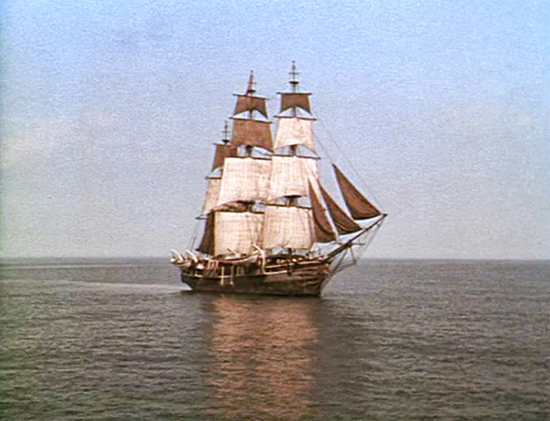
Nautilus Books and Reproductions From: Phineas Gillrayn-Flewk, junior peon To: Ajax Paige, Grand High Poo Bah cc: J. Huston, R. Broadberry Date: February 23rd, 1956 Memo: "Moby Dick" project In re: Ancillary revenue/ Novelizing the MGM film written by Roy Broadberry and John Huston Jax, I have just finished the most torturous waste of good pulpwood I have ever swallowed, which, on your orders, I dutifully digested in a marathon THIR-TEE-SIX-HOURS, despite its extraordinary length of better (or worse!) than SIX HUNDRED VERY ODD PAGES. Towards thee I balefully glare, thou all-destroying but unsympathetic publisher; to the last I censor thee; from hell's red fountain pen I stab at thee; for hate's sake I spit my last gargle of bourbon at thee. Forgive my bluntless, Jax, but my vision swirls like the whirlpool that gulps down the Pequod, and I think I left my right eyeball lashed to the blubbery skin of Morbid Dick himself. Don't bother answering this memo; I intend to resign as soon as it's sent; again after lunch; and a third time at Sammy Chong's bar-mitzvah. You will never see me again; tell all the boys at Forty-Second street that I drowned in that horrible tome -- that tombstone -- writ with loathing and vendetta by that utter ass, Melvin Somebody, the man you hired without bothering to consult me. Me! Whence came this Melvin blister? I never saw the germ before, and his name is so forgettable I've already forgotten it. Have you seen the Godawful telephone book he turned in? Six hundred pages (reads like six thousand). And the son of a monkey had the damned temerity to slap a cardboard binder on it and illustrate the Damned Thing! As if anyone would (or could) publish the wretched writing in present form, with or without a frustrated illustrator. 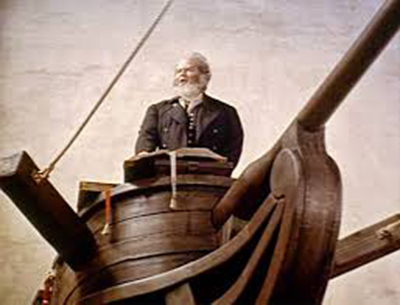
I suspect Melvin never bothered reading the actual screenplay he was supposed to turn into a novel (just to make a few samolians off the egghead trade). I'm of the opinion he merely skimmed Roy Broadberry's wonderful script; or perhaps he just read Mr. Huston's treatment. Either way, Melvin then wandered out and devoured a whaling library. Melvin the Novelizer begins with a few brief words from the beginning of the screenplay, then tacks on an abbreviated version of the ending. In between, he flushes the entire "white whale" motif down the pipes to Davy Jones' digs and belches forth the remaining, undistributed middle bits "Moby free." Ahab may as well be chasing a guppy, or a will-o'-the-wisp, for all we can tell from the Melvinism. Thus, the entire quest and confrontation devolves into a paper-thin envelope of vague excitement, stuffed with a mountain of meaningless verbiage. (The phrase "focus" should appear frequently and prominently in our swift and summary rejection of this so-called "author," Melvin Somebody.) While racing through Melvin's literary antics, I began to notice certain similarities to an earlier feature I watched long ago, during the so-called "silent" era of movies. (Five hundred kids packing the Bijou is the opposite of silent; as you must remember, it's a cacophany of caterwalling catcalls.) Anyway, I saw this movie back then, and it was titled the Sea Beast. Brace yourself, Jax; I'm afraid Melvin's meanderings were not even original. Fancy that. Our present film was not the first about the whilte whale: It first gained life as a silent, and I'm afraid your protege Melvin simply cribbed the story from this early flicker. Look, it's got Queequeeq, Stubbs, Flash, Pip, Fedallah, Daggo, and even Captain Ahab himself -- along with Ahab's brother Derek, and a love intrigue; what happened to them? In this original version, in addition to the romantic rivalry between the two sea-faring brothers (erased in Melvin's sub-par version), the Sea Beast had a crackerjack happy ending, much better even than Broadberry's screenplay: Ahab slays the monster leviathan and wins the girl! (Can't we go back to that version?) Nevermind. Such a satisfying conclusion would never do in Melvin's world; he rewrites a perfectly enjoyable adventure romp into an egotistical exposition of existential angst. Cushlamochre, if Melvin really wants to send a "message," tell me to try Western Union! But something else still nags at me, can't quite tease it out yet; I have another remembrance, but damned if I can't dredge it up to the survace just yet. But let us return to the decline and fall of Melvin's marvelous mockery of Moby Dick. Am I overly harsh to Master Melvin? Let's examine the evidence of his literary perfidies in the mode of Sherlock Holmes: What, praytell, is the title of this movie? Moby Dick. Moby Dick is a...? Whale. Melvin seems to have absorbed that much. What is our intrepid captain, Ahab, doing all through this tale of vengeance and obsession? Chasing the whale Moby Dick. What happens to our Biblically-dubbed protagonist? Caught and killed by Moby Dick, after summary "tragedization" of the original, upbeat Sea Beast. One might conclude that the whale, M.B., is vaguely important to the plot. So, Jax, can anybody explain why, in Melvin's novelization, Moby Dick doesn't even make an appearance until the last few pages of this doorstop? Granted, in Broadberry's enthralling quest, the final encounter also comes at the end of the movie, as one would expect. But that "end" encompasses the final third part of the whole movie! In Melvin Shmelvin's precious manuscript, the chase and the final disaster comprises but a scant twentieth of the book. Am I the only one to see how this minimizes our climax? And why does our scribe divide that crimp of a climax into not one, not two, but three chapters, thus distributing wispy shreds of excitement into three packets of a handful of pages each. Ye gods, talk about killing the ending! Aha, Jax, I've just recollected (rediscovered?) that secondary memory of yet another original, or more original than the Melvinism: Back in the Second World War, or shortly thereafter, I remember reading a comic book, Classic Comics, to my son Agamemnon that seems very close to Melvin's scurrilous novelization. That would-be Hemingway is slippery as an eel; he apparently regurgitated the Sea Beast and served it up with hot, buttered lashings of the Classic Comics Moby Dick, all rolled into one gigantic plagiarism, screaming for a cop. I said "rediscovered" earlier because I begin to suspect that we haven't delved the depths yet. If there is a Classic Comics Moby Dick from the forties, and the Sea Beast from the twenties, might there not be an actual book predating both? I speak of an Ur-Dick, a primal Moby: Couldn't there be a forgotten novel whence all the Mobys originally emerged? Judging from the action-adventure, and the lack of introspective navel-gazing (based upon the Broadberry screenplay), I suspect such a book would have to have been published sometime in the early 20s or late teens, akin to the Mark of Zorro (1920), taken from Johnston McCully's novel the Curse of Capistrano, or Captain Blood (1924), from the Rafael Sabatini novel of 1922. Might be fruitful to hunt down this primal Moby and see what the original author thought! (Besides, he might still own copyright.) Can't we just fire the literary lightweight, parboil his puffed-up plagiarism, and use that original novel instead? Well at least when Melvin cribbed, he cribbed from impeccable sources. What a thief, or producer, Melvin could have been! But let us return to those thrilling days of Melvin's definitive destruction of Roy Broadberry's rollicking roller-coaster. Your wunderkind has apparently decided, in his infinite superiority, that he must have more chapters than any other book in the history of the American novel: a hundred and thirty blessed five of the three-page charmers (reads like a thousand chapters). But Melvin's deviance extends far beyond a bit of copycatting, overwriting, and a tin ear. I am swimming in the ocean of his criminal literary incompetence; I stoop to the sin of specificity. How does he flub thee? Let me count the ways: In the beginning, Broadberry created Queequeg. He is a major character, if generally silent in the screenplay. But it seems that Melvin took a dislike to the cannibal, or perhaps due to his sieve-like mind, he simply forgot. Because in Melvin's novelization, after the scene in the inn, Queequeg simply vanishes for hundreds of pages! With one last hurrah: a bizarre "illness" sequence in which Queequeg talks himself almost into Davy Jones' locker. This weirdity takes the place of the scary and exciting knife fight (naturally), the deadly duel that nearly slays Ishmael. In Melvin's enervated and emasculated version, the cannibal Queequeg becomes a baby, lost in a childish ill-humor. He is passive, pouty, and just about the polar opposite of a manly harpooner. Naturally! 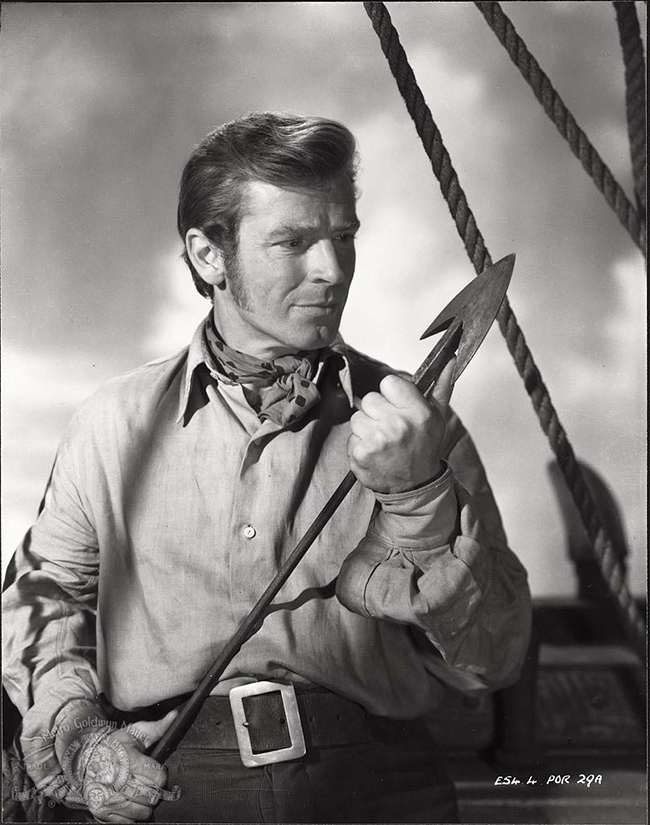
In Broadberry's screenplay, the knife fight that almost kills Ishmael is there for a reason: It leads directly and dramatically into the final struggle between Ahab and the monstrous white whale. (They say they're going to build a full-sized Moby. I'll believe it when I believe it.) Delete that knife fight, substitute the hypochondriac sequence, and the whole scene becomes a silly, empty ritual, which only makes Queequeg look like a quitter. Or a madman. (I hesitate, even in this memo, to mention the perverted and frankly sickening scenes in the novelization with the cannibal and Ishmael snuggling up in bed, back at the inn. Nauseating. Those scenes won't even survive the censors, let alone the audience's emetic control. Let us not speak of this again; it does not belong in the novelization.) Second, and this is simply annoying, why the lengthy colloquy about whether a whale is a fish? In the first place, as Mr. Broadberry himself surely knows, a whale, like every other cetacean, is a mammal. Period. And in the second place, who the heck cares? It's a novelization of Broadberry's screenplay, not a class in basic taxonomy. Third, has Melvin ever heard the aphorism that brevity is the soul of wit? Every stray thought that gurgles through that jamoke's leaky brain dribbles into the manuscript, whence it must be mopped up with an industrial sized sponge. Fourth, my eyeballs are falling out due to the nigh interminable interior monologues (absolutely none of them taken from the Oscar-quality screenplay). Melvin's characters stand on stage, hand on heart, and declaim, like a parody of a nineteenth-century overactor. Boy does he declaim! Nor does he ever decline to declaim; he ne'er denies a declamation, delighting to design himself as a detereoating deacon of Demosthenean desuetude. I deem it direly delight-less and de-ugly. Which brings me, in the fifth place, to Melvin's brain-melting love of litotes. You know what I mean, as in George Orwell's Politics and the English Language: "A not unblack dog was chasing a not unsmall rabbit across a not ungreen field." It is non unheard-of for authors occasionally not to undistance the narrative by this not unfoolish device; but it's also not unimaginable to write not unstraightforwardly. Our Melvin deflates his beloved litotes to low art, adorning nearly every paragraph, and at times every sentence!, with one or more examples of that structure. And (sixth) there are Melvin's horrid, gargantuan run-on sentences. I here introduce exhibit A, comparing and contrasting mast-head standers (i.e., in the crow's nest) with other people who ascend poles for various reasons (don't ask!): "In Saint Stylites, the famous Christian hermit of old times, who built him a lofty stone pillar in the desert and spent the whole latter portion of his life on its summit, hoisting his food from the ground with a tackle; in him we have a remarkable instance of a dauntless stander-of-mast-heads; who was not to be driven from his place by fogs or frosts, rain, hail, or sleet; but valiantly facing everything out out the last, literally died at his post." Try diagramming that sentence, Jax. I am acutely aware that novelizing a movie requires the addition of new material. But that doesn't give Melvin license to make up entire sequences that never appear in Broadberry's brilliant screenplay, such as the elaborate crafting of Queequeg's sealed and water-tight coffin that, lo! -- becomes Ishmael's miraculous liferaft; it should have just been a hunk of driftwood. Or the improbable bumping into dozens, scores of other ships, for no plot purpose, just to fill the novel with more meaningless blather. Or the mass killing spree of the Pequod, wherein our "heroes," the protagonists, butcher far more whales than they can possibly use for sperm oil; it makes them look hoggish, like bloodthirsty despoilers. The novelization has become topheavy with meaningless incident and pedantry. When a book of ours has more use as an anchor than as an entertainment, it augurs poorly for sales.
Lord love a Please, God, tell that lad I surrender; I'll make him a deal: For his novelization of Mr. Broadberry's excellent action-adventure movie, please include only those scenes and incidents that actually appear in Roy Broadberry's script! Nothing added, nothing left out from the screenplay; though the latter seems not to be Melvin's sin: He remembers the minutest and most useless soupcon of research and shovels it all into the book. Then after we publish Melvin's novelization, I shall personally give serious attention and consideration to Melvin's God damned eight-volume, comprehensive, encyclopaedic, how-to manual on nineteenth-century whaling lore, which he clearly would rather be writing than the contracted book. 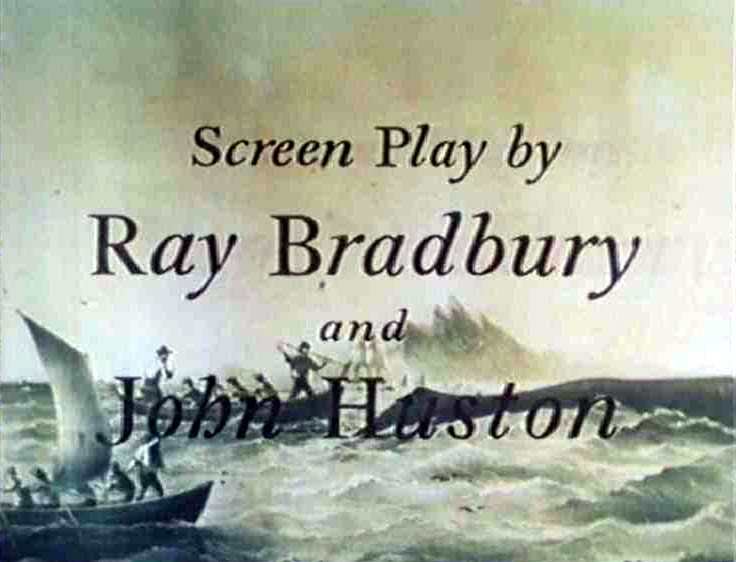
Nautilus Books and Reproductions From: Phineas Gillrayn-Flewk, junior peon To: Ajax Paige, Grand High Poo Bah cc: J. Huston, R. Bradbury Date: February 25th, 1956 Memo: "Moby Dick" project In re: Ancillary revenue/ Novelizing the MGM film written by Ray Bradbury and John Huston All right, Ajax, I am official a idiot. A ass. When you first telephoned me and told me the name of the screenwriter, I slightly misheard. I had no idea that the gentleman you spoke of was none other than the author of the Martian Chronicles! I love that book! I understand that Mr. Bradbury lives in Los Angeles; any chance I could meet him? Shocking as may be, he's one fellow from whom I would love to have an autograph. Me, the original cynic! I don't know who is this "Roy Broadberry" imposter -- have him thrown out the studio on his posterior, forthwith! 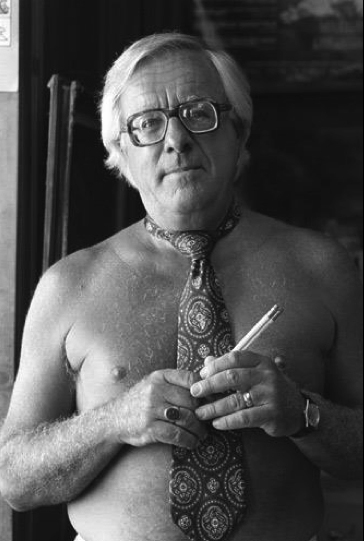
Nautilus Books and Reproductions From: Phineas Gillrayn-Flewk, junior peon To: Ajax Paige, Jackass Extraordinaire cc: J. Huston, R. Bradbury Date: February 26th, 1956 last memo before my resignation Memo: "Moby Dick" by Herman Melvin In re: Ancillary revenue/ Novelizing the MGM film written by Ray Bradbury and John Huston, who were probably in on this conspiracy and are both assholes in any event Har de har har. Very funny. Thanks very large. Mr. Paige, to choose a word at random, U R A PRICK. Of the first water. All right, took me a while but I finally figured out how you did it: You bought a copy of the book Moby Dick, PUBLISHED IN 1851 I now find, and sliced the pages off the commercial binding. Jackanapes. Or more likely, you had Jeannie do it, as you're not to be trusted with sharp objects. You had it rebound with our own pasteboard binders, to make it look like an unbound review copy. Oh how clever you are. So you made me look like a complete moron. I don't know who else you shared this with, but it doesn't matter, because if Jeannie of the Platinum Blonde Peroxide was involved, then the entire bloody-damn studios -- no, the entire industry! -- knows all about it. You do realize I can never live this down. I have no choice but to resign, shoot myself, divorce my wife, and put my children into an orphanage, in that order. I suppose Jeannie is laughing her ass off (which is too bad, it's her finest feature). I'll never have another "extra curricular" again... not that I ever have had, except in my dreams. But this is just -- humiliating. I intend to hand you my resignation as soon as I send this memo; then again when I get home to my shattered family; and a third time when I'm lying in a morgue drawer. I haven't even seen rushes yet, just the screenplay and that wretched, awful novel it came from. But I can tell you this, Mr. Ajax Fancypants Paige: Of all the versions of Moby Dick in existence or ever will exist, I HATE THIS FEATURE MOST OF ALL. It stinks almost as much as you. Best of all, I like the Classic Comics version. Eat that, you unmitigated bastard. So farewell forever; find yourself a new whipping boy... if anyone will still work with a duplicitous, deceitful, seni-ambulatory ball of fertilizer like you, fatso. Adios, jerk. Call me when you're ready for lunch. |
||||||||||||||||



